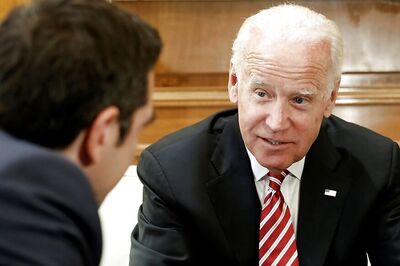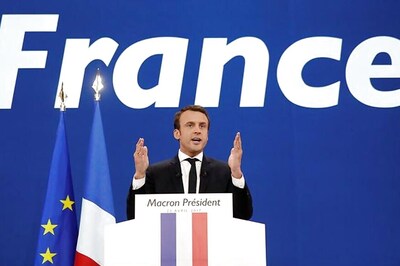
views
On a visit to the friendly United Arab Emirates (UAE), Pakistan’s Prime Minister Shehbaz Sharif called upon his hosts to nudge India back to the negotiating table to find peaceful solutions to outstanding issues. However, there was the usual rider and precondition – India had to restore the special status of Jammu and Kashmir annulling the August 2019 decision of granting complete statehood.
Speaking to the Al Arabiya news channel in Abu Dhabi, Sharif disclosed that he had requested Mohammed bin Zayed — that he can play a very important role to bring the two countries to the talking table. “Even if we are not neighbours by choice, we are there forever, and it is up to us to live peacefully. We have learned our lessons. We have had three wars with India and the consequence of those wars has only brought more misery, unemployment, and poverty. We are both nuclear powers. God forbid if a war takes place, who will live to tell what happened? This is not an option. My message to the Indian leadership is that let us sit down at the table and have serious and sincere talks to resolve our burning issues like Kashmir,” he said. At the same time, he referred to ‘flagrant human rights violations’ and ‘persecution of minorities’ in India.
For good measure, the prime minister’s spokesman later tweeted (on 17 January) that “talks can only take place after India has reversed its illegal action of 5 August 2019. Without India’s revocation of this step, negotiations are not possible.”
It would almost appear that the prime minister, in the course of the interview, forgot that it was not India but Pakistan which was supposedly reaching out. Talk of scoring a neat self-goal! Clearly, this ‘non-offer’ is a non-starter and Pakistan knows that. So why even try? Because Pakistan cannot help being itself! Speaking with a forked tongue has become second nature. Whether or not Pakistan has learned any lesson, India has certainly learned an important one — that Pakistan is a dysfunctional state which will not mend its ways easily.
India did well by not reacting at all to Sharif’s so-called overture in any event. It was typical grandstanding meant to impress the Arab world, the international community, particularly the International Monetary Fund (IMF) and appease the de-facto powers back home namely the military and the deep state.
But that does not mean that India does not want to find a modus vivendi with Pakistan. India has been trying to normalise the ties assiduously for decades, only to be rebuffed and repaid with a terror attack or a misadventure at the border. Islamabad has displayed compulsive hostility and systematically stymied the functioning of SAARC and for that matter any initiative taken by India to enhance regional cooperation. It could not rise above petty politics even in the face of the devastating Covid pandemic, when Indian Prime Minister Narendra Modi convened a virtual SAARC (South Asian Association for Regional Cooperation) conference on 15 March 2020, proposing the setting up of a Covid Emergency Fund for SAARC countries and offering the services of a Rapid Response Team of doctors and specialists, along with testing kits and other equipment.
Realising the futility of the efforts in the prevailing atmosphere and outlook in Pakistan, the Modi government decided to concentrate its energies on deepening ties with other South Asian nations, the results of which are clearly visible. That said, Shehbaz Sharif is right that geographical imperatives make it incumbent on both countries to find a way to coexist peacefully and, if possible, cooperatively. However, lofty pronouncements are no substitute for walking the talk. The ball is in Pakistan’s court which needs to bring it into play.
Pakistan is in the economic doldrums and seeped in debt, with no viable solution in sight. Inflation is going through the roof. People are hurting and angry. The incendiary internal politics is not helping. Pakistani provinces are getting more restive. Tehrik-e-Taliban Pakistan (TTP) is on the rampage. The Pakistan-Afghanistan border is heating up and the Taliban is turning against its mentor.
With respect to India, sooner or later the tide will turn, but for that, a national consensus would have to be painstakingly built within Pakistan by slowly draining the swamp. So much poison and hatred has been injected into the popular discourse against India and in Pakistani polity, that for the change to be enduring, it has to be gradual and incremental. For starters, the terror infrastructure would have to be dismantled.
How or when will this happen and who will shepherd the change in Pakistan is difficult to predict. But right now, Pakistan is not ready and nor is Sharif, who himself is skating on thin ice in a position to deliver. His government has not been elected by the people but selected by the Army, with its very legitimacy in question. Imran Khan with his ever-increasing popularity is constantly snapping at its heels.
Pakistan also needs to shed its habit of seeking external interventions to solve its problems. It needs to take ownership and find the solutions within, through candid introspection. That is where it would find the right answers, provided Islamabad keeps national interests at the forefront. India has the best relations with the UAE, which is a valuable partner. Abu Dhabi is also too seasoned a player to needlessly wade into India-Pakistan issues.
The author is Former Envoy to South Korea and Canada and Official Spokesperson to the Ministry of External Affairs. The views expressed in this article are those of the author and do not represent the stand of this publication.
Read all the Latest Opinions here




















Comments
0 comment